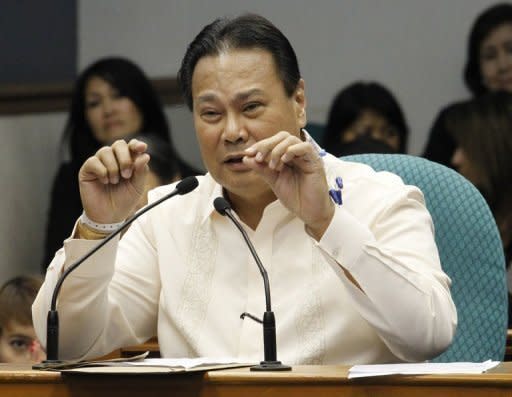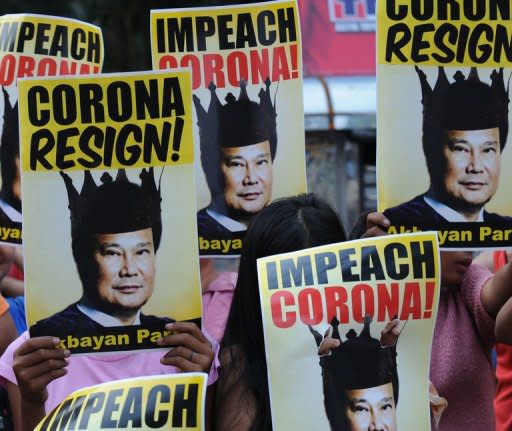Philippines' top judge sacked over graft
The Philippines' top judge was sacked on Tuesday after the Senate found him guilty of hiding millions of dollars, in the biggest win of President Benigno Aquino's anti-graft campaign. Following an impeachment trial lasting more than four months, Supreme Court chief justice Renato Corona was convicted of violating the constitution and betraying public trust by failing to disclose his wealth. Two thirds of the 23 senators were required to convict Corona and 20 found him guilty, paving the way for him to become the first chief justice in the nation's history to be removed from office. "In accordance with the 1987 constitution, the judgment of conviction by the Senate impeachment court results (in Corona's) removal and disqualification from public office," Aquino's spokesman, Edwin Lacierda, told AFP. Aquino had repeatedly said removing Corona was crucial to ending a culture of corruption that pervades all levels of Philippine society and that he alleged flourished during Arroyo's near-decade in power ending in 2010. Aquino won a landslide election and succeeded Arroyo after campaigning on a platform to eradicate the graft that he blamed for the country's widespread poverty. He quickly went to work by sacking Arroyo appointees in government organisations, as well as a top government prosecutor seen as sympathetic to her. But he said Corona, a Harvard-trained lawyer and longtime ally of Arroyo, was blocking his efforts to fight graft while protecting the ex-president from prosecution. Aquino maintained Arroyo had illegally appointed Corona to the post of chief justice in the days before she handed over power, in violation of a constitutional ban on "midnight appointments" by outgoing presidents. Corona then enraged Aquino late last year when the Supreme Court overturned a government order banning Arroyo from leaving the country. Arroyo was arrested at a hospital shortly after government officials blocked her at Manila airport while trying to leave. She is now in detention while on trial for vote rigging. In December, Aquino's allies in the House of Representatives impeached Corona, sending the complaint to trial in the Senate. Corona, 63, was also officially accused of unlawfully trying to protect Arroyo from prosecution. However no verdict was delivered Tuesday on the protection charges after Corona was found guilty of the first offence of failing to disclose his assets. Corona admitted last week during his trial that he had not disclosed more than $4 million in bank accounts. But he said $2.4 million in US dollar accounts were protected by a law allowing absolute secrecy for foreign currencies, and the other money in Philippine peso accounts belonged to his relatives. Corona insisted his wealth was accumulated legitimately through his long legal career and by his family. Aquino's critics alleged that, in his zeal to go after Corona, the president breached constitutional provisions ensuring the separation of powers between the government, the legislature and the judiciary. But various opinion polls showed widespread support for Aquino. The president also enjoyed the backing of the military, crucial in a country where coup attempts and dictatorship have featured in recent political history. His office released a short but subdued statement after Tuesday's verdict welcoming the Senate's decision. "Mr Corona is merely the public face of the things that ail our justice system," Aquino's spokeswoman, Abigail Valte, told reporters. "Let us never forget that those who come to court, be they rich or poor, must do so in the expectation of receiving impartial justice from those who uphold both the spirit and the letter of the law." Corona issued a statement saying he accepted the verdict. "If this is for the public good, I hereby accept the Calvary (punishment) that we are going through, because from the start, I have always been ready to offer my own life for our people," he said.



